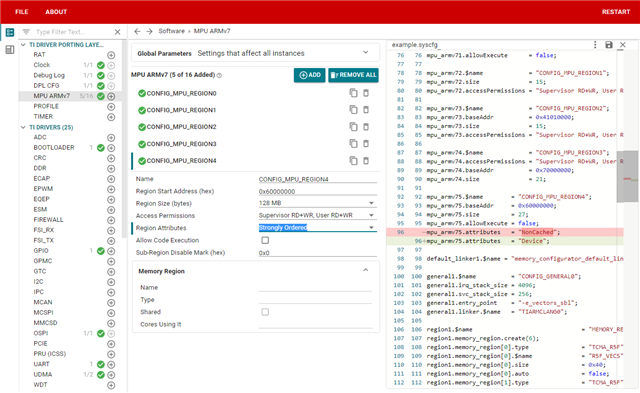Other Parts Discussed in Thread: SYSCONFIG, UNIFLASH
Tool/software:
Hello TI experts,
I am trying to modify SBL to write firmware (XIP format) to Flash.
The SDK version is MCU+ SDK v10.00.00.20.
I have two problems here, and I would appreciate it if you could answer them.
<No.1>
I cannot write to Flash in the SBL process. (The return value of Flash_write() is an error.)
The steps I took are as follows.
1. I removed the firmware read process from the SBL example[*1] and added a Flash write process.
2. I referred to the OSPI example[*2] for the Flash write process.
*1: examples/drivers/boot/sbl_ospi
*2: examples/ospi/ospi_flash_io
The resulting source code (main.c) is as follows.
The Flash writing process starts on line 135.
/*
* Copyright (C) 2018-2022 Texas Instruments Incorporated
*
* Redistribution and use in source and binary forms, with or without
* modification, are permitted provided that the following conditions
* are met:
*
* Redistributions of source code must retain the above copyright
* notice, this list of conditions and the following disclaimer.
*
* Redistributions in binary form must reproduce the above copyright
* notice, this list of conditions and the following disclaimer in the
* documentation and/or other materials provided with the
* distribution.
*
* Neither the name of Texas Instruments Incorporated nor the names of
* its contributors may be used to endorse or promote products derived
* from this software without specific prior written permission.
*
* THIS SOFTWARE IS PROVIDED BY THE COPYRIGHT HOLDERS AND CONTRIBUTORS
* "AS IS" AND ANY EXPRESS OR IMPLIED WARRANTIES, INCLUDING, BUT NOT
* LIMITED TO, THE IMPLIED WARRANTIES OF MERCHANTABILITY AND FITNESS FOR
* A PARTICULAR PURPOSE ARE DISCLAIMED. IN NO EVENT SHALL THE COPYRIGHT
* OWNER OR CONTRIBUTORS BE LIABLE FOR ANY DIRECT, INDIRECT, INCIDENTAL,
* SPECIAL, EXEMPLARY, OR CONSEQUENTIAL DAMAGES (INCLUDING, BUT NOT
* LIMITED TO, PROCUREMENT OF SUBSTITUTE GOODS OR SERVICES; LOSS OF USE,
* DATA, OR PROFITS; OR BUSINESS INTERRUPTION) HOWEVER CAUSED AND ON ANY
* THEORY OF LIABILITY, WHETHER IN CONTRACT, STRICT LIABILITY, OR TORT
* (INCLUDING NEGLIGENCE OR OTHERWISE) ARISING IN ANY WAY OUT OF THE USE
* OF THIS SOFTWARE, EVEN IF ADVISED OF THE POSSIBILITY OF SUCH DAMAGE.
*/
#include <stdlib.h>
#include "ti_drivers_config.h"
#include "ti_drivers_open_close.h"
#include "ti_board_open_close.h"
#include <drivers/sciclient.h>
#include <drivers/bootloader/soc/bootloader_soc.h>
#include <drivers/bootloader.h>
#include <kernel/dpl/ClockP.h>
#define DELAY_SEC (1000U)
#define APP_OSPI_FLASH_OFFSET_BASE (0x200000U)
#define APP_OSPI_DATA_SIZE (2048)
static uint8_t gOspiTxBuf[APP_OSPI_DATA_SIZE];
void flashFixUpQspiBoot(void);
void ospi_flash_io_fill_buffers(void);
/* call this API to stop the booting process and spin, do that you can connect
* debugger, load symbols and then make the 'loop' variable as 0 to continue execution
* with debugger connected.
*/
void loop_forever(void)
{
volatile uint32_t loop = 1;
while(loop)
;
}
int main(void)
{
int32_t status;
Bootloader_profileReset();
Bootloader_socWaitForFWBoot();
#ifndef DISABLE_WARM_REST_WA
/* Warm Reset Workaround to prevent CPSW register lockup */
if (!Bootloader_socIsMCUResetIsoEnabled())
{
Bootloader_socResetWorkaround();
}
#endif
Bootloader_profileAddProfilePoint("SYSFW init");
if (!Bootloader_socIsMCUResetIsoEnabled())
{
/* Update devGrp to ALL to initialize MCU domain when reset isolation is
not enabled */
Sciclient_BoardCfgPrms_t boardCfgPrms_pm =
{
.boardConfigLow = (uint32_t)0,
.boardConfigHigh = 0,
.boardConfigSize = 0,
.devGrp = DEVGRP_ALL,
};
status = Sciclient_boardCfgPm(&boardCfgPrms_pm);
Sciclient_BoardCfgPrms_t boardCfgPrms_rm =
{
.boardConfigLow = (uint32_t)0,
.boardConfigHigh = 0,
.boardConfigSize = 0,
.devGrp = DEVGRP_ALL,
};
status = Sciclient_boardCfgRm(&boardCfgPrms_rm);
/* Enable MCU PLL. MCU PLL will not be enabled by DMSC when devGrp is set
to Main in boardCfg */
Bootloader_enableMCUPLL();
}
Bootloader_socOpenFirewalls();
Bootloader_socNotifyFirewallOpen();
System_init();
Bootloader_profileAddProfilePoint("System_init");
Drivers_open();
Bootloader_profileAddProfilePoint("Drivers_open");
#if 0
DebugP_log("\r\n");
DebugP_log("Starting OSPI Bootloader ... \r\n");
#endif
/* ROM doesn't reset the QSPI flash. So do a flash reset */
flashFixUpQspiBoot();
status = Board_driversOpen();
DebugP_assert(status == SystemP_SUCCESS);
Bootloader_profileAddProfilePoint("Board_driversOpen");
status = Sciclient_getVersionCheck(1);
Bootloader_profileAddProfilePoint("Sciclient Get Version");
#if (1)
// Flash writing process based on ospi_flash_io exmaple code.
uint32_t block;
uint32_t page;
uint32_t offset = APP_OSPI_FLASH_OFFSET_BASE;
if(SystemP_SUCCESS == status) {
// Erase block
ospi_flash_io_fill_buffers();
DebugP_log("Erase Flash (%x)...", offset);
Flash_offsetToBlkPage(gFlashHandle[CONFIG_FLASH0], offset, &block, &page);
DebugP_log("block=[%x], page=[%x]\r\n", block, page);
status = Flash_eraseBlk(gFlashHandle[CONFIG_FLASH0], block);
}
if (status == SystemP_SUCCESS) {
// Write
DebugP_log("Writing to Flash (src: %p, dst: %x)...", gOspiTxBuf, offset);
ospi_flash_io_fill_buffers();
status = Flash_write(gFlashHandle[CONFIG_FLASH0], offset, gOspiTxBuf, APP_OSPI_DATA_SIZE);
DebugP_log("Done. status=[%d]\r\n", status);
}
#endif
if(status != SystemP_SUCCESS )
{
DebugP_log("Some tests have failed!!\r\n");
}
Drivers_close();
System_deinit();
return 0;
}
void flashFixUpQspiBoot(void)
{
uint32_t gpiobaseAddr, pinnum;
/* Get address after translation translate */
gpiobaseAddr = (uint32_t) AddrTranslateP_getLocalAddr(CONFIG_GPIO0_BASE_ADDR);
pinnum = CONFIG_GPIO0_PIN;
/* Drive the GPIO Pin low to assert the reset signal */
GPIO_pinWriteLow(gpiobaseAddr, pinnum);
ClockP_usleep(DELAY_SEC);
/* Drive the GPIO Pin high to deassert the reset signal */
GPIO_pinWriteHigh(gpiobaseAddr, pinnum);
ClockP_usleep(DELAY_SEC);
}
void ospi_flash_io_fill_buffers(void)
{
uint32_t i;
for(i = 0U; i < APP_OSPI_DATA_SIZE; i++)
{
gOspiTxBuf[i] = i % 256;
}
}
The execution result is as follows.
DMSC Firmware Version 10.0.8--v10.00.08 (Fiery Fox) DMSC Firmware revision 0xa DMSC ABI revision 4.0 Erase Flash (200000)...block=[8], page=[0] Writing to Flash (src: 70075008, dst: 200000)...Done. status=[-1] Some tests have failed!!
The Flash writing process has been confirmed to work correctly when running the OSPI example[*2] alone.
The cause of the error in SBL is unknown, so if you have any clues, please let me know.
<No.2>
I want to use the Bootloader module to perform XIP operation on each core,
but when writing the XIP format to Flash, what address should I write the .appimage_xip to?
Should I overwrite it to the same address as the .appimage?
Please tell me the procedure.
Regards,
TAKEDA Taro


